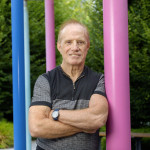At HIV diagnosis, should gay men be told that they can still have children, even if at that moment children are the last thing on their minds? Maybe so, if clinicians want to fight HIV stigma, according to a qualitative study published in the journal BMC Public Health.
As part of a team led by Tristan Barber, MD, at University College London, Robert Pralat, PhD, a sociology researcher at the University of Cambridge, interviewed 25 men living with HIV who identified as gay or bisexual about their desire for children and whether they’d ever talked to a doctor about it. In addition, researchers interviewed 16 of their health care providers.
The men came from four demographically and socioeconomically diverse clinics around London. Still, they were rather homogenous in their demographics. Most were white, in their 30s and had a college degree and a job. Only one participant was Black, and almost all of the men identified as gay. Most of the men—14 of them—were single, and eight of them had an HIV-negative partner. Only three had partners who were also living with HIV.
Actual parenthood desires varied. The eight men in their 20s said they weren’t closed off to the possibility of having children in the future, though it wasn’t a priority at the time.
When the researchers asked the men and their providers about parenthood discussions, a few themes emerged:
- Men living with HIV and their clinicians agreed that this was a rare conversation between them. Only four of the 25 men said they had discussed the topic.
- Others said they may have been told about parenthood, but the information got drowned out by all the other HIV-specific data they received at clinic visits.
- The clinicians said they assumed that parenthood was not a priority for the men. If they asked at all, they inquired if the men already had children. If the response was “Oh god no!” they didn’t bring up the desire for future children either. “I don’t need to have that conversation,” one physician said they thought to themselves.
- Clinicians who themselves had children were more likely to bring it up in passing. The clinicians’ gender also played a role.
- Clinicians who worked in a “patient-led clinic” hesitated to raise the question of parenthood out of fear that clients would perceive them as “pushing an agenda” to have children.
- Some clinicians said it simply never occurred to them, in part because they thought about parenthood wishes only in regard to straight women. “I wouldn’t ask them that,” one clinician said. “I’d respond if I was asked, but I wouldn’t give them information, perhaps in the way I would if I was with a straight man or woman. Which may be wrong.”
This lack of information left some men with questions. “Even though I don’t have any intention [to become a parent], it’s something I’d be curious about—in case, you know, I decided to do it,” one said. Another said he’d never been asked about parenthood before, and now that the researchers had broached the subject, he had questions “that I didn’t realize were there.” “That alone is justification for there being some kind of provision for discussing parenting,” a man in his late 20s said.
Many men perceived their HIV to be a barrier to parenthood, and it was an area around which HIV stigma lingered. When one man asked whether he could adopt, the clinician said, “It should be all right.” One man said he would have wanted to know about the possibility of having children from the beginning, not because he planned to use that information to become a father himself but because it would have taken away some of that negative programming about what it means to be living with HIV.
“[If] they told me, ‘Listen, you’ll have boyfriends, you’ll be fine…. But at that point, you can’t really hear that,” he said. “The idea of having kids…just in a practical sense, like, well, this cannot happen. You know, my sperm is now sullied, it cannot be used by anyone.”
Another man in hs 30s agreed and said his HIV diagnosis killed his earlier desire to be a father. “It doesn’t even cross my mind anymore,” said the man. “[B]efore I was diagnosed, I had always grown up thinking, you know, Just because I’m gay that doesn’t mean that I will never have children… But since diagnosis, I’ve just kind of thought, Well, that’s just not going to be possible.”
Most of the men said they rarely heard about Undetectable Equals Untransmittable (U=U)—that is, the science showing that a person with a durably undetectable viral load can’t pass HIV on to a partner. That includes not being able to transmit HIV to a surrogate or as part of in vitro fertilization.
Only two men reported being told this news without prompting, and another two reported asking about it. The two men who reported receiving information about U=U said it occurred in the context of care received at a clinic that mostly catered to women.
All this led Pralat and colleagues to surmise that explaining parenthood options could be a good practice on its own, even when men didn’t intend to become fathers.
“Our findings highlight the potentially beneficial effects of emphasizing that having children is a possibility at diagnosis, regardless of patients’ gender or sexuality,” they wrote. “Conveying this information seems meaningful, not only to the men who want to become parents in the future but also to others, as it appears to alleviate fears about mortality and ill health.”
Click here to read the full study.
Click here to learn more about parenthood options for people living with HIV and read more news about the science of U=U.







Comments
Comments